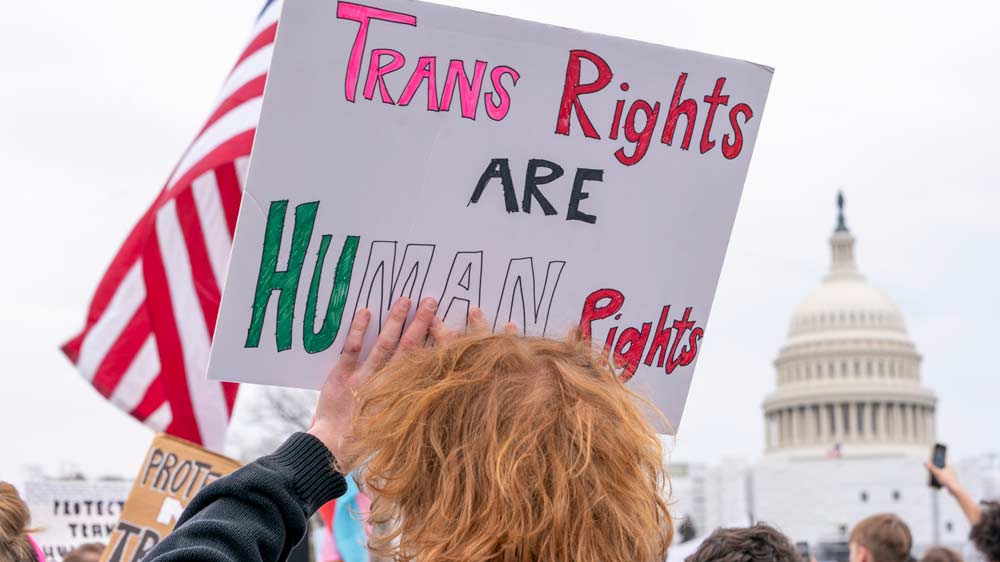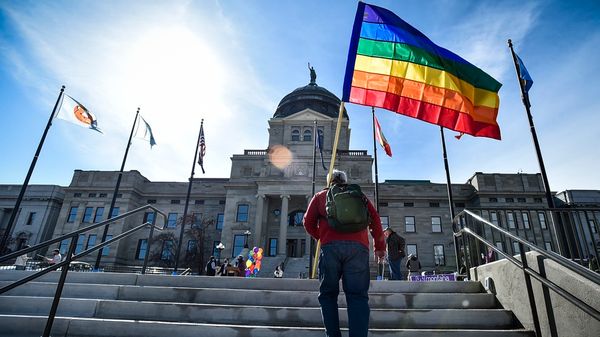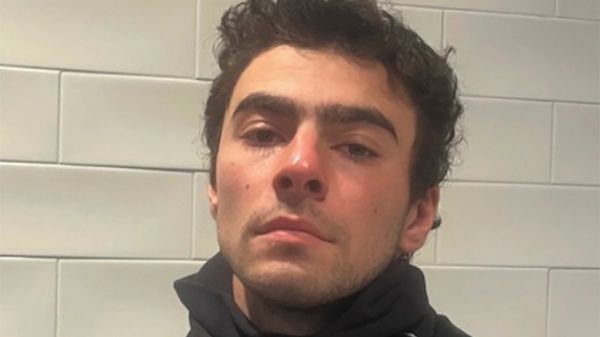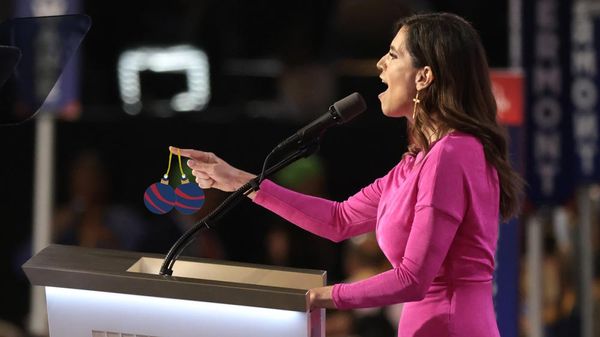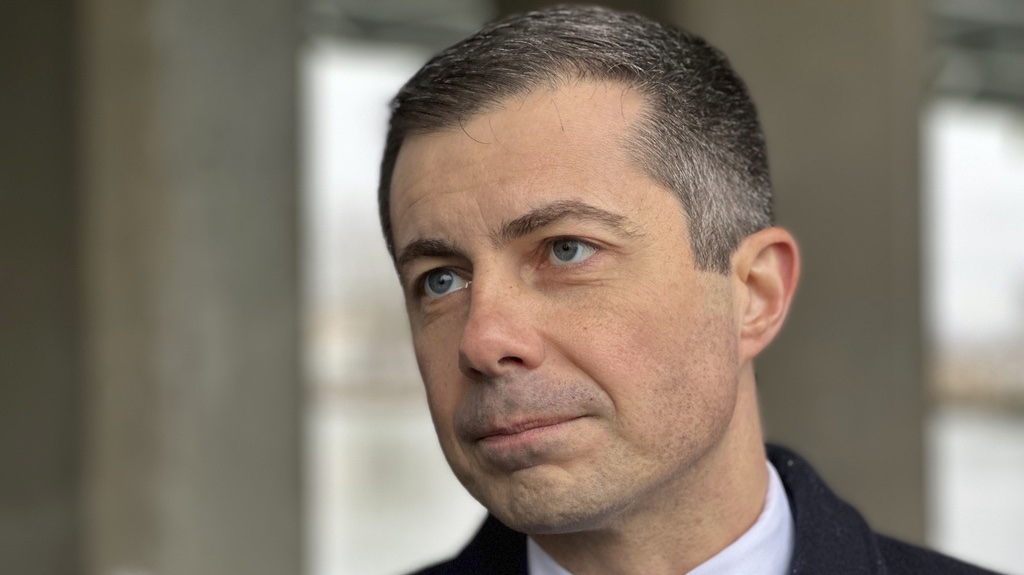
Today
Michigan Democrats Look Toward a Future that Some Hope Includes Pete Buttigieg
Joey Cappelletti READ TIME: 4 MIN.
In a packed union hall outside Detroit, a worker shifts the conversation from policy to the personal, quizzing Transportation Secretary Pete Buttigieg on his knowledge of Michigan, the state he only recently started calling home.
"Mayor Pete – Secretary Pete, I apologize," one auto worker yelled from the crowd. "Now that you're a Michigander, who do the Lions play Sunday?"
Caught off guard, the former mayor of South Bend, Indiana, couldn't provide an answer. Familiarity with the schedule of Detroit's long-suffering but recently soaring football team isn't an official prerequisite for holding statewide office. But the casual exchange illustrates the challenge Buttigieg may face in proving his connection to Michigan voters – a hurdle some Democrats nevertheless hope he'll take on by entering a crowded governor's race.
Though Buttigieg has publicly and privately stated that he won't make any decisions about his future until after the Biden administration ends on Jan. 20, he has already fielded calls from Michigan Democrats urging him to enter the 2026 race to replace Gov. Gretchen Whitmer, who is term limited.
Buttigieg, who moved to Traverse City, Michigan, soon after his unsuccessful presidential campaign in 2020, hasn't ruled out the possibility, according to a source speaking on condition of anonymity to discuss private conversations.
"I haven't made any decisions about, big decisions about my future. And I know that we've got six more weeks and we're going to sprint through the tape," Buttigieg told reporters at an event south of Detroit on Monday.
Bound by the nature of his official trip, Buttigieg avoided political questions during his visit, which included a stop at a union hall in Dearborn before heading south of Detroit to highlight nearly $200 million in federal funding to replace a bridge. But pressure on him to enter the governor's race will likely only intensify after Detroit Mayor Mike Duggan, expected by many Democrats to be the leading contender to succeed Whitmer, announced last week plans to run as an independent.
"People are shocked and stunned and angry. Many view this as a serious situation where Mike Duggan could put the governor's mansion in the hands of Republicans and roll back years of progress," said Andrew Feldman, a Democratic strategist who has worked for the state party.
Michigan Democrats, who until recently had been posting big wins in a battleground state and advanced a progressive agenda with remarkable party unity, suddenly find themselves in a new period of turmoil after significant losses in the 2024 election, including a backbreaking defeat in the presidential race.
President-elect Donald Trump won the state by a wider margin than in 2016, and Republicans reclaimed control of the state House, ending Democratic dominance in the Legislature. In their final month holding a slim majority in both chambers, the party has struggled to pass significant legislation, hampered by internal divisions.
While Whitmer – herself the subject of speculation about whether she'll seek higher office – still has two years remaining in her term, Duggan's surprise move has kick-started the race to replace her and has left Democrats worried the mayor of Michigan's largest city could drain support from their candidate and hand the office over to Republicans.
Buttigieg, who vaulted to prominence with his 2020 presidential run and deftly engaged with conservative audiences on behalf of President Joe Biden and Vice President Kamala Harris, could have the appeal to win that support back.
"I personally want to thank you for going up, facing the Fox News crowd, listening to people's questions and answering. And I think you're one of the few politicians that does that," an attendee told Buttigieg at the union hall on Monday, earning loud applause.
Buttigieg moved to Michigan to be closer to his husband's family, he said in an interview with The Associated Press on Monday. "I grew up a few miles from the state line, so even growing up I was getting the news from Michigan and from both sides of the state line. And I could point to any number of moments over the years, some wonderful and some really tough, like when our little guy was in the intensive care in Grand Rapids."
"But, yeah, bottom line, this is home," Buttigieg said.
Other potential candidates may not be ready to concede either race just yet. Michigan Democrats still boast one of the deepest political benches in the country, with several other high-profile candidates expected to join the race soon.
Secretary of State Jocelyn Benson confirmed last week that she is "certainly considering" a gubernatorial bid and is actively listening to voters' concerns as she weighs her decision. She also criticized Duggan for abandoning the party rather than grappling with its challenges.
"For me, it's important that in moments like this, we don't flee from the party, but we stay and fix it," Benson said during a televised interview with reporters.
Lt. Gov. Garlin Gilchrist II is also considering a gubernatorial bid and has assembled a team to explore the possibility, though a final decision won't be made until 2025, according to a source with direct knowledge. A 42-year-old Detroit native, Gilchrist, who is Black, could provide a strong contrast to the 66-year-old Duggan, who is white. If he runs, Gilchrist plans to engage with voters who feel the Democratic Party has failed to address their frustrations with the status quo, the source said.
There also are a number of dark horse candidates, including Genesee County Sheriff Chris Swanson. The Flint-area sheriff rose to prominence after he marched with a crowd of protesters in the wake of the death of George Floyd in 2020. Swanson, who spoke at the Democratic National Convention in August, recently told the AP that he has a "team doing due diligence" about a possible run.
"When it comes to the Democratic Party in Michigan, it is a prime time for them to restructure," Swanson said during a recent interview. "To not have a polarizing platform, but a more unifying one."
"The entire playbook has to be evaluated and restructured to go and listen to the people," he added.
